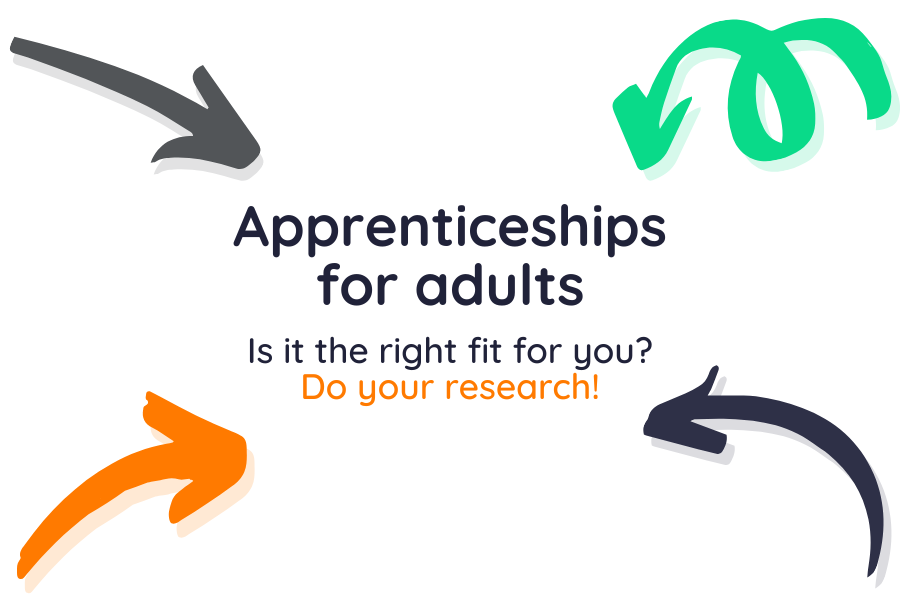No matter your stage in life or your career history. Apprenticeships offer paid on-the-job training, plus a nationally recognised qualification. It’s never too late to chase your dreams.
Here’s our guide to answering your questions about apprenticeships for adults. Plus, what you do during an apprenticeship and how to find one.
What is an apprenticeship?
An on-the-job qualification that will give you work experience and a qualification. Apprenticeships teach you both technical skills and highly valued soft skills to further your career.
Apprenticeships for adults are available in practically every industry you can think of. If you know what you’re interested in doing for your career, there is an apprenticeship out there for you. From an intermediate level right up to a degree.
To start an apprenticeship, there are some requirements, like previous experience and education. You can find more information about the details of levels and entry requirements related to the individual apprenticeship within the job details..
Apprenticeships are free to individuals. The fees are paid by the employer.
Can older adults complete an apprenticeship?

Apprenticeships are not just for younger people. It’s not like the old YTS and adults of any age can do an apprenticeship. Whether it’s to gain new skills and qualifications in your existing job or help you advance your career. Or to retrain and change careers completely. Government statistics show that 48% of apprentices by adults aged 24-34. And 22% of all apprentices are over the age of 35.
Do employers offer apprenticeships for adults?
Let’s not beat around the bush. It’s often cheaper to employ younger apprentices. This is because apprentices are paid in accordance with the national minimum wage (see below). And for some companies, a lower hourly rate can be what makes their decision.
Apart from being discriminatory, this practice is also short-sighted. Mature apprentices offer a wealth of experience in both work and life. Giving employers value for their investment while they retrain.
What will I do on an apprenticeship?
Most apprenticeships are full-time, however, you can also work part-time at a minimum of 30 hours per week. 80% of your time will be spent doing the actual job, allowing you to gain valuable experience while you retrain. The remaining 20% must be spent learning.
Learning can be through formal classroom training at a college or other provider. It can also be online training or on-the-job guided learning.
At the end of your apprenticeship period, you will take an assessment to show the skills and knowledge you have learned.
How long does an apprenticeship take?

The time it takes to complete an apprenticeship depends on:
- the level of qualification
- sector
- requirements of the employer
- your ability
An intermediate level takes around 12-18 months, an Advanced level around 2 years and a Higher/Degree level between 3-6 years to complete.
The best part about an apprenticeship is that you’re working whilst learning, so that’s one to six years of experience you’re gaining too.
What will I earn as an apprentice?

Apprentices must be paid in line with the National Minimum Wage. As of April 2025, in the first year of the apprenticeship, you are entitled to £7.55 per hour (around £14,500 per year full-time). After that, you are entitled to the national minimum wage for your age group. For 21 years+ this is £12.21 per hour (around £23,500 per year full time).
These are just the minimum requirements and employers can choose to pay their apprentices more. You will also be entitled to the same benefits as other employees. This includes holidays, sick pay and company perks like healthcare plans and other benefits if available.
Ok, so this might mean a drop in your income. But remember you’re getting paid to retrain and build experience in your new career.
As a student, you will also be eligible to access funding from the government. What you can get depends on your qualifications and your personal circumstances. Turn2us.co.uk are a national charity offering advice and support for adult learners. They can help you find out what support you are eligible for.
You’re getting paid to retrain and build experience in your new career
How do I find apprenticeships for adults?
Apprenticeships are offered by employers. Advertised similarly to ordinary jobs. There’s no difference between apprenticeships for adults and younger people.
The Government Apprenticeship website is a good place to start. You can search for apprenticeship levels and industries in your local area. The Apprenticeship Guide also has an extensive list of apprenticeship employers by sector and by region.
If you can’t find what you’re looking for on apprenticeship vacancy sites, you can use other methods. If you are interested in a particular employer, visit their website or follow them on social media. Whilst they may not have any apprenticeships advertised, you can contact them to enquire if they take apprentices.
How do I know if an apprenticeship is right for me?

The Apprenticeship Guide provides some useful real-life case studies which can help you get a feel for what an apprenticeship is like.
For more specific information, you could approach a company that employs apprentices in your field of interest. Ask if you could be put in contact with one of their apprentices to find out first-hand what it’s like.
If you’re chasing the job of your dreams, retraining through an apprenticeship could be the perfect answer. You can earn money while you learn on the job and gain a nationally recognised qualification.
Are you a mature apprentice? Or are you considering an apprenticeship as a form of retraining? Why not share your experiences in the comments below.
At Career Street, we know you’re more than words on a CV. Using a brief video, you get to show employers what you’re really like.

